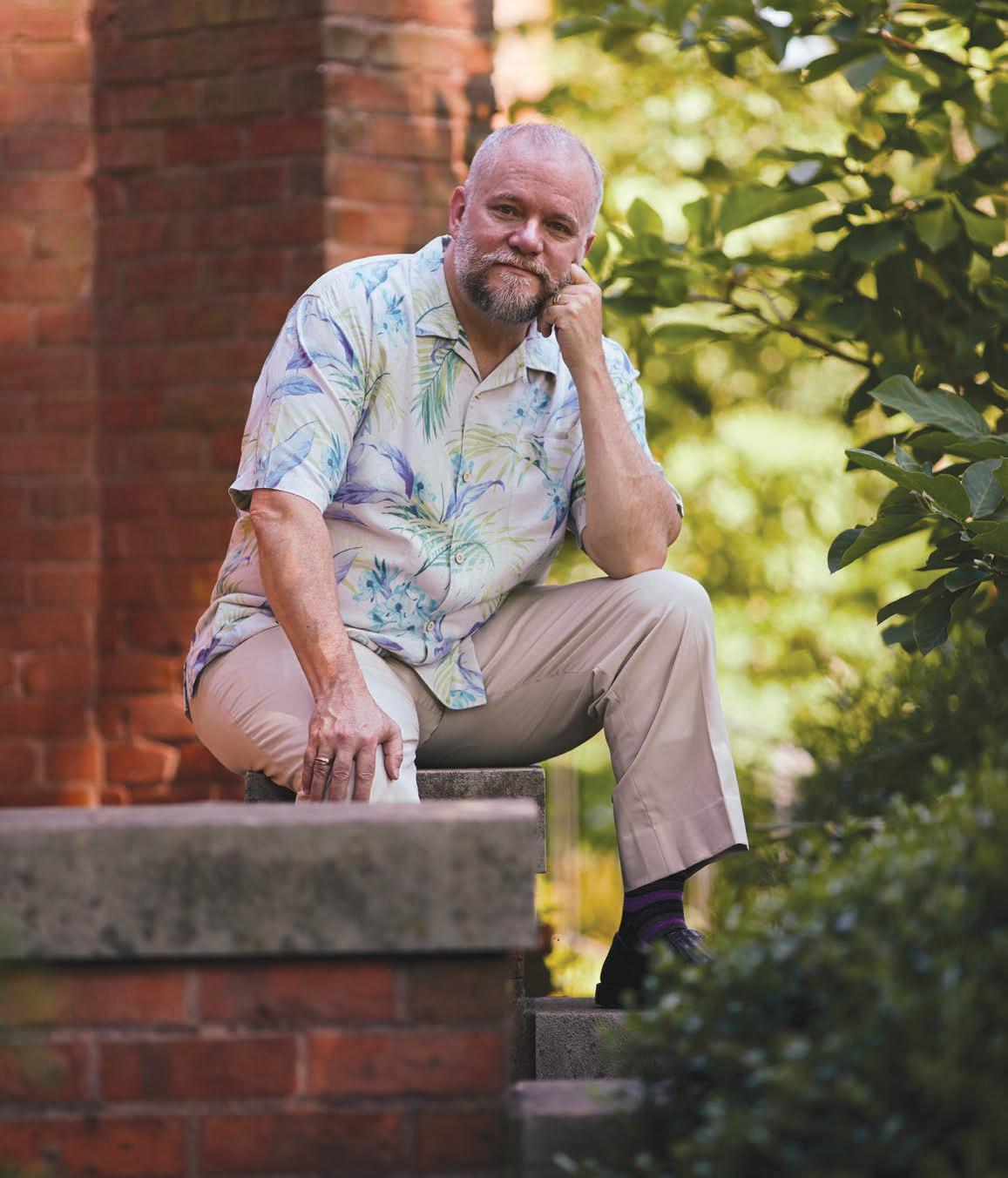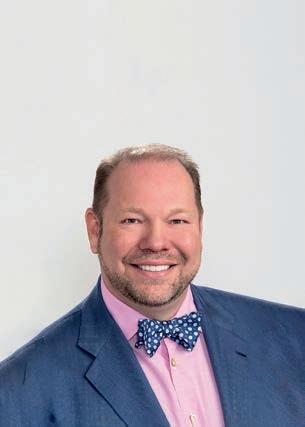
8 minute read
Life Lessons
BUZZTHE
WHAT MATTERS NOW IN THE CITY
LIFE LESSONS JOHN QUILLIN
The Gay Men’s Chorus founder on music, acceptance, and his nearly four decades in Charlotte
BY ALLISON FUTTERMAN
IN THE EARLY 1990s, at the height of the AIDS crisis, musician, singer, and LGBTQ activist John Quillin added the 51st name to a list he kept of the friends he’d lost. Then he stopped counting. “I just cried and cried. I couldn’t do it anymore,” he says. “They had so much to o er the world, and they were all dead.”
By then, Quillin was already a leader in Charlotte’s LGBTQ community, and he’s continued his activism to this day. In 2006, he merged his activism and lifelong passion for music by founding Gay Men’s Chorus of Charlotte, now a 51-member group that tours and performs at community functions, and is so inclusive it doesn’t require members to be gay. We recently caught up with Quillin, 61, to
talk about his work with the chorus and his own experience in Charlotte over the last 39 years. His words have been edited for space and clarity.
I’M ORIGINALLY FROM KINGSPORT, in East Tennessee. I moved to Charlotte in 1981, chasing my rst love. It did not end well.
I LOVED IT HERE. It was an easy place to make friends. There were so many transplants, and everyone was looking to connect. That worked to my advantage.
THERE WASN’T MUCH GOING ON in the LGBT community. There were a few bars, which I didn’t go to. There was a group called “Acceptance,” and there was the Gay and Lesbian Switchboard, but I didn’t know about either of them at that time. My activism started in 1983, and I became deeply involved, even running the switchboard for a couple of years.
THERE’S BEEN A LOT OF CHANGE in the Charlotte LGBT community. At rst, we didn’t have any arts organizations. We now have a plethora of things that run the gamut, including youth services. Who could imagine being out as a teenager in 1981?
I WAS IN IT AT THE TIME, but I was prepared to go into the ministry. I was going to matriculate in seminary, but then decided the Presbyterian Church was not ready for me. And I wasn’t ready for the Church.
THE PRESBYTERIAN CHURCH IN THE SOUTH was more conservative than up North, and there was very limited LGBT clergy. My experience with the Presbyterians wasn’t personal. Nobody said, “Get out of here, you faggot.”
TO GET A POSITION AS A MINISTER, an individual congregation had to invite you. They basically hired you. And you’d have to be ordained by the Presbytery. That was really hard to do if you were gay. I didn’t want to ght with them about whether I could be myself and who I thought God created me to be.
I COULDN’T GO TO CHURCH for about 10 years. It made me angry to feel like my calling was yanked away from me by people who didn’t know any better. It took a long time for me to reconcile with the Church, but I did. Eventually, I ended up attending the Episcopal church that hosts the Gay Men’s Chorus of Charlotte. They’re open and generous and Christlike.
I STARTED PLAYING CELLO in sixth grade. That’s a late start, by comparison, but I really took to it. I majored in cello and composition in college. But there weren’t enough hours in the day for a performance major and composition, so I dropped composition and stuck with cello. I wound up changing my major to music theory, because that allowed me to get out of the music building a little more o en. A degree in music theory allowed me to get as close as possible to a choral conducting degree. I also taught myself guitar, because it’s not like you can take a cello out by a re and start playing. I was part of a bluegrass gospel band, and we went all over North Carolina, singing in churches. It was a lot of fun. I’VE BEEN MARRIED FOR FIVE YEARS, and together with my husband, Rick Ha ner, for 28 years. He’s an American Sign Language interpreter. We met at a Gay and Lesbian Association of Choruses festival in Denver. The Columbus Gay Men’s Chorus took the stage, and they had the most amazing sign language interpreter. He did such a beautiful job, it made me cry. I wrote in the program book that I wanted to marry the sign language interpreter! We made lunch plans and have been together ever since.
GAY MEN’S CHORUSES got started out of the AIDS crises of the ’80s and ’90s. We were singing for our lives. To this day, the Gay Men’s Chorus of Los Angeles lists the members who died. It’s a huge list. Our chorus is mostly gay men, but you don’t actually have to be gay or a man to be in our chorus. We’ve had straight women, lesbian women, trans men, and trans women. Our 51 members range in age from mid-twenties to 78, and the ages are pretty evenly spaced. And they come from a variety of elds, including healthcare, banking, education, and IT.
WE TRY TO DO A REPERTOIRE that features music by gay composers and works commissioned by other gay choruses. We also commission work ourselves that celebrate LGBT culture. It’s about connecting with the audience but also about embracing and celebrating gay male culture. We do “Dancing Queen,” “Believe” by Cher, and we include a song speci c to losing friends to AIDS.
IT’S IMPORTANT TO CREATE compelling programming, especially around social justice. We spread a message of inclusion and kindness. LGBT citizens have a lot to do with changing the world, and we want to create a society that values and respects LGBT citizens.
THE SONG “MAKE THEM HEAR YOU” means, “Don’t give up your voice.” Don’t let it be silenced. You will be found. It’s a strong song of hope that lets people know they’re not alone. You might think you are, but we’re here. And other people are, too.
WE DO TICKETED CONCERTS, but we also do a lot of community engagements. We’ve been invited to play at churches, restaurants, museums—for bene t performances. It helps raise awareness and money for LGBT causes.
WHEN MUSICIANS ARE IN THE MOMENT, that’s when the connection with the audience happens. You can’t communicate with the audience if you’re not in the moment with the music. I’m willing to let some things go in rehearsals, as far as imperfections.
—JOHN QUILLIN
of the material. The audience will be forgiving about a small imperfection. As managing artistic director, I get the blame when things go wrong. When things go right, it’s nice to give recognition to other people.
OVER TIME, we’ve advanced with our artistic achievement and been able to take on more di cult musical challenges. We consistently sound twice the size we are. As we’ve become recognized for our artistic achievement, we’ve gotten more invitations. We sing well, consistently, and we get that recognition.
WE’VE ONLY BEEN PROTESTED ONCE, and it was only a couple of people. It wasn’t really much of a protest. In the South, if you act like nothing’s wrong, everyone will usually do the same. So if we act like being gay is no big deal, most people respond the same way.
WHEN WE GOT AN ARTS AND SCIENCE COUNCIL GRANT, it was a huge deal. They had never funded an LGBT organization with operating support. They also invited us to participate in Culture Feast last fall. Their recognition and support was a huge a rmation.
ONE TIME, AFTER A CONCERT, we were greeting folks and a family introduced themselves. They were from West Virginia. We asked what brought them to town, and they said they came here just to see the concert. They brought their son, who had never seen anything like this. He had just come out as gay. I was oored that these parents were so supportive that they drove him about 300 miles to see us. There have been times when parents will call and ask if we will let their kids play with us. They say, “My child needs this.” And we’ve let them.
WHEN THE HB2 SITUATION HAPPENED, we commissioned a piece of music around it. There’s a guy in Seattle, Eric Lane Barnes. He’s hysterically funny. Not mean, but he makes a situation clear with humor. We wanted a piece we could perform but also that other gay choruses could use, because there were similar bills in the works in other cities. It was called, “Our Number One Problem.” And one line went, “We just want to tinkle. We just want to whiz. We never stop to think about what a brave act it is.”
I SEE IT AS A THREE-LEGGED STOOL. You have social change, otherwise you’re just any old choir. You must have artistic excellence, because it doesn’t matter what your message is if you don’t have artistic excellence. And third is family. We couldn’t do what it takes without the camaraderie and support. The music matters, but it’s about way more than the music. We’re singing to create change in the world.
ALLISON FUTTERMAN is a freelance writer based in Charlotte. She can be reached at aliwrites10@gmail.com.

Michael Murphy II is a full-time REALTOR®/Broker who is committed to enhancing the quality of life for each of his clients. Michael’s goal is for his clients to have the best possible experience; whether that is buying a new home, or selling an existing one. As part of a top leading relocation firm, Michael can help with all your real estate needs across the world. When you choose a Dickens Mitchener agent, you are putting your trust in the most talented, experienced, and technologically astute REALTORS® in the Charlotte region. We are committed to setting new standards for extraordinary customer service as well as providing our clients with intimate community knowledge and expertise.

MICHAEL MURPHY II
REALTOR®/BROKER 704.914.5747
mmurphy@dickensmitchener.com
Your Best Source for Residential Real Estate.










